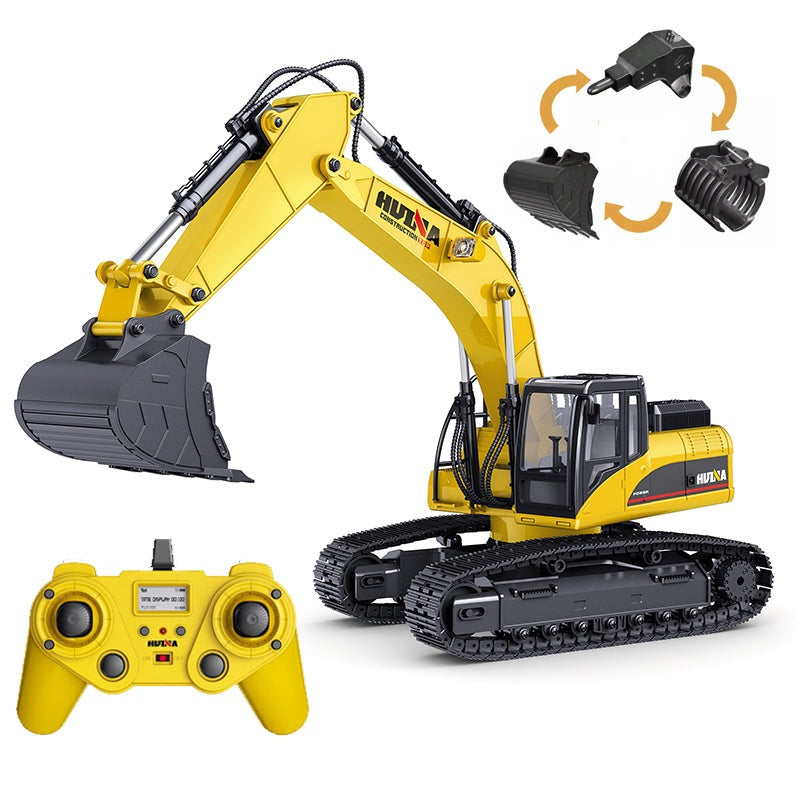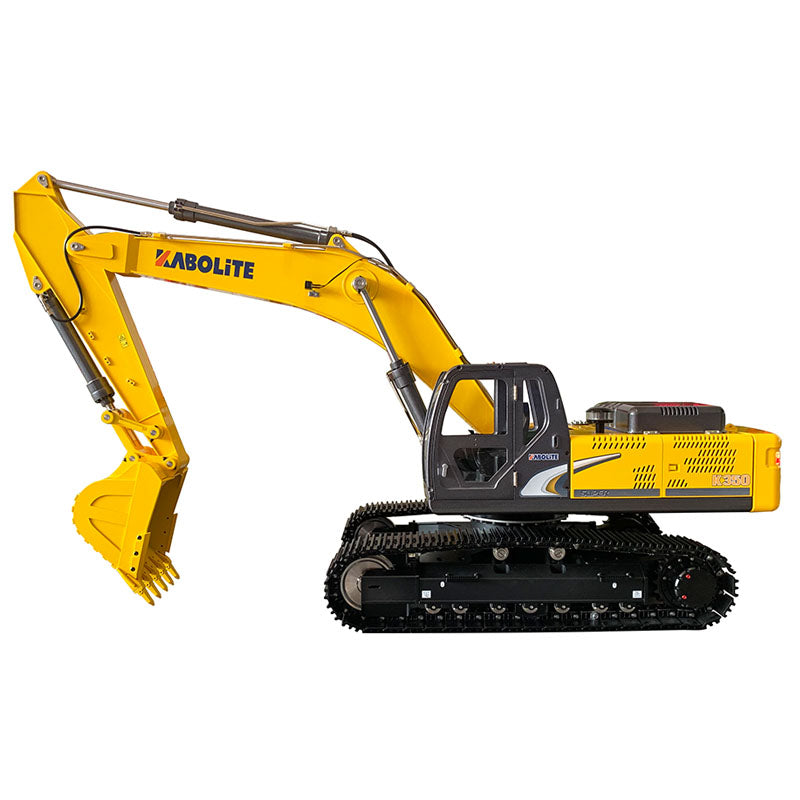Understanding Just How Excavator Functions and Its Impact on Efficiency
Excavators play an important duty in construction and mining procedures, relying on an intricate interaction of hydraulic and mechanical systems. Their ability to do a selection of tasks pivots on both their design and the modern technology integrated within. Understanding these components can substantially impact operational performance and performance. As improvements continue to reshape the sector, one need to consider just how these changes will certainly affect future methods and efficiency.
The Fundamentals of Excavator Mechanics

The Duty of Hydraulic Systems in Excavators
At the heart of excavator operation exists the hydraulic system, which plays a critical function in powering the machine's motions and features. This system uses pressurized hydraulic liquid to move energy, making it possible for various activities such as digging, lifting, and swinging. By harnessing the principles of hydraulics, excavators can execute tasks with amazing accuracy and pressure, boosting overall operational efficiency.The hydraulic system includes essential elements, consisting of cylinders, pumps, and shutoffs, which work together to control the circulation and instructions of the fluid. When the driver involves the controls, the hydraulic fluid is directed to specific cyndrical tubes, equating the operator's commands right into physical motion. This mechanism permits smooth and receptive actions, which are important in construction and excavation environments. double e volvo rc excavator. The performance of the hydraulic system directly impacts the productivity and versatility of the excavator, making it a vital aspect in contemporary excavation processes
Key Components of an Excavator
Comprehending the essential parts of an excavator is necessary for grasping just how this powerful equipment operates. An excavator is composed of a number of significant components, including the undercarriage, residence, bucket, boom, and arm. The undercarriage gives stability and wheelchair, usually featuring tracks or wheels to navigate various terrains. Your home includes the engine and hydraulic systems, enabling the operator to manage movement and power the device. The boom expands from your house, allowing vertical reach, while the arm attaches to the container, helping with digging and training operations.Additionally, the cab houses the driver, geared up with controls for exact handling. Each of these parts plays an important role in the excavator's total capability, contributing to its effectiveness and effectiveness on building and construction websites. Recognizing these components helps in maintaining and optimizing excavator efficiency, ensuring jobs are finished securely and successfully.
Accessory Flexibility and Its Benefits
Attachment versatility is an essential aspect of excavators, allowing drivers to switch in between different tools customized for specific tasks. This adaptability not only boosts task efficiency but also adds to cost-effectiveness by decreasing the demand for multiple machines. Recognizing the different types of accessories offered can considerably affect the overall performance and performance of an excavator on task sites.
Sorts of Add-ons
While excavators are largely recognized for their excavating capabilities, their real convenience depends on the broad selection of accessories offered. These attachments enhance the excavator's functionality, enabling it to do various tasks beyond excavation. Typical attachments consist of buckets (for excavating and scooping), hydraulic thumbs (for grasping materials), and augers (for drilling holes) Grapples are utilized for taking care of and moving particles, while rippers can damage up hard surface areas. Other specialized attachments, such as trenchers and plows, make it possible for excavators to adapt to particular work demands. This variety not only enhances the maker's utility across various markets, including demolition, landscaping, and construction, yet likewise permits drivers to customize their equipment to meet specific task demands efficiently.
Increased Work Performance
Taking full advantage of job performance is a primary advantage of making use of numerous excavator attachments. Different add-ons allow an excavator to perform numerous tasks without requiring to switch over tools, saving useful time and labor. For example, using a hydraulic hammer can break concrete while a container accessory can excavate soil, making it possible for a seamless operations. This convenience decreases downtime related to equipment adjustments and boosts efficiency on-site. Furthermore, specialized accessories enhance accuracy in tasks such as grading or landscaping, bring about higher top quality end results. The capacity to adjust to numerous job demands not only enhances procedures but additionally decreases the need for added machinery, making sure that projects are finished quickly and effectively. Generally, accessory adaptability substantially adds to enhanced job efficiency in excavation job.
Cost-Effectiveness and Versatility
Cost-effectiveness is a substantial advantage of using flexible excavator attachments. These add-ons enable a single excavator to carry out multiple tasks, minimizing the demand for additional equipment and labor - double e volvo rc excavator. By switching in between buckets, hammers, and grapples, operators can tackle numerous projects, from excavating to demolition, therefore making best use of tools application. This adaptability not just decreases operational expenses however additionally lessens downtime related to transforming devices. Additionally, the capability to tailor excavators with specialized attachments improves efficiency, as they can effectively take care of varied tasks according to job demands. In conclusion, the mix of cost-effectiveness and convenience in excavator add-ons adds to improved functional performance and resource allotment in building and construction and excavation tasks

Advanced Modern Technology in Modern Excavators
Modern excavators are progressively furnished with sophisticated technology that transforms excavation procedures. Automation simplifies procedures, while improved fuel performance lowers functional expenses. In addition, clever control systems boost accuracy and safety, marking a substantial development in excavation tools.
Automation in Excavation Processes
As excavation modern technology advances, automation has arised as a critical component in improving efficiency and precision on work sites. Modern excavators are furnished with innovative automated systems that help with tasks such as grading, excavating, and trenching with very little operator intervention. These systems use sensors, GPS, and device learning algorithms to guarantee exact positioning and deepness control, substantially lowering the margin for error. Additionally, automation permits drivers to concentrate on calculated decision-making instead of hand-operated controls, bring about improved efficiency in general. Such technologies not just simplify operations however likewise improve safety by reducing human mistake in intricate operations. As a result, the integration of automation in excavation procedures stands for a substantial innovation in building technology, driving the industry in the direction of greater effectiveness and efficiency.
Enhanced Gas Effectiveness
Developments in technology have likewise resulted in considerable renovations in gas performance for modern excavators. Modern makers are furnished with advanced engines that enhance power output while lowering fuel consumption. These engines make use of innovative combustion modern technologies, such as turbocharging and straight gas injection, to improve performance and effectiveness. Furthermore, light-weight materials in building decrease overall weight, enabling for much less power expenditure during procedure. The introduction of variable rate controls makes it possible for operators to adjust engine performance according to certain tasks, even more lessening gas usage. Because of this, these enhancements not only reduced functional costs yet additionally contribute to ecological sustainability by reducing emissions. On the whole, enhanced gas performance in excavators is an essential growth that reinforces performance and financial feasibility in the construction sector.
Smart Control Systems
While operators navigate significantly complex task sites, smart control systems in excavators have become crucial devices for boosting effectiveness and precision. These innovative innovations make use of formulas and sensing units to keep track of different specifications such as load weight, terrain conditions, and functional efficiency. By instantly readjusting hydraulic functions, smart systems maximize maker efficiency, bring about enhanced performance and reduced endure elements. In addition, operators take advantage of user-friendly interfaces that give real-time responses and diagnostics, permitting notified decision-making. This integration of technology not only streamlines procedures but also lessens human error, contributing to safer workplace. As the building market remains to develop, smart control systems will play a crucial function fit the future of excavator efficiency and effectiveness.
Enhancing Functional Effectiveness With Excavators
Excavators play a necessary duty in improving operational effectiveness across various building and construction and excavation tasks. Their versatility enables numerous tasks, consisting of lifting, excavating, and product here are the findings handling, which streamlines workflows and minimizes the need for why not try here added equipment. With powerful hydraulic systems, excavators can carry out durable jobs with precision, considerably lowering the moment required to total jobs. The combination of advanced technology, such as GPS and automated controls, additionally optimizes their procedure, allowing operators to attain better accuracy and minimize material waste. In addition, modern-day excavators are made to eat much less fuel and minimize discharges, adding to both price financial savings and environmental sustainability. By utilizing excavators efficiently, construction groups can enhance efficiency, fulfill task deadlines, and improve total site monitoring. This multifunctionality and efficiency make excavators crucial devices in the modern-day construction landscape.
The Future of Excavators in Building And Construction and Mining Industries
As the building and construction and mining markets develop, the future of excavators is poised for considerable transformation driven by technological innovation and transforming functional demands. Advancements in automation and man-made intelligence are reshaping excavator capacities, permitting boosted accuracy and effectiveness in procedures. Independent excavators are arising, reducing the requirement for human intervention and decreasing the threat of accidents.Moreover, the combination of telematics and IoT modern technology allows real-time surveillance of equipment performance and anticipating maintenance, enhancing uptime. Green designs, including electric and hybrid models, are obtaining grip, lining up with sustainability goals within the industry.Additionally, using advanced products and lighter layouts improves fuel performance while preserving performance requirements. As these patterns development, excavators will play a vital duty in fulfilling the enhancing demands for performance and safety in construction and mining, eventually transforming functional landscapes.
Often Asked Inquiries
How Do Climate Condition Affect Excavator Efficiency?

Climate conditions significantly affect excavator efficiency, as rainfall and mud can prevent grip and security, while extreme temperature levels might affect hydraulic systems. Operators needs to adjust to these variables to ensure perfect capability and safety throughout operations.
What Security Procedures Should Operators Comply With While Using Excavators?
Precaution for excavator operators include putting on suitable personal safety tools, performing pre-operation evaluations, making certain appropriate interaction with ground workers, maintaining a secure range from overhanging risks, and adhering to established operational procedures to avoid mishaps.
Exactly How Frequently Should Excavators Be Maintained for Optimal Performance?
Excavators must be maintained routinely to guarantee peak efficiency, typically every 250 operating hours or as defined by the producer. Routine checks improve integrity, prevent unexpected breakdowns, and extend the lifespan of the equipment.
What Is the Average Life-span of an Excavator?
The ordinary life expectancy of an excavator commonly ranges from 10,000 to 15,000 hours of operation. Elements influencing longevity consist of upkeep methods, operating problems, and the top quality of the equipment itself, impacting overall efficiency and performance.

Can Excavators Run on Uneven Surface Effectively?
Excavators can operate efficiently on uneven surface as a result of their verbalized designs and adjustable tracks. These features permit them to maintain stability and grip, making it possible for efficient operation in difficult environments commonly come across in building and landscape design tasks. Each of these parts plays a vital duty in the excavator's general capability, contributing to its efficiency and effectiveness on building and construction sites. Making best use of task efficiency is a main advantage of using numerous excavator attachments. While drivers browse increasingly complex task sites, wise control you could look here systems in excavators have arised as essential tools for boosting performance and precision. Excavators play a necessary duty in enhancing operational performance across numerous building and excavation jobs. Advancements in automation and fabricated knowledge are improving excavator capabilities, enabling for boosted accuracy and effectiveness in operations.
Comments on “Why the Double E Volvo rc excavator Stands Out in Excavation and Demolition Projects”